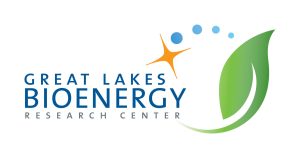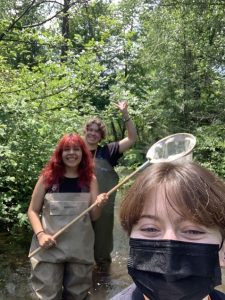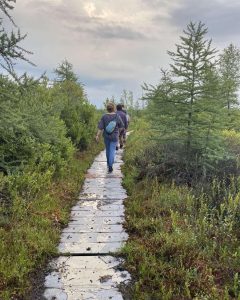***Summer 2025 URA Applications are now closed. Please check back in Fall 2025 for our Summer 2026 URA opportunities.***
KBS offers an Undergraduate Research Apprenticeship (URA) Program featuring paid research positions with outstanding faculty, postdocs and graduate students.The 2025 KBS URA program will run for 10 weeks, from Sunday, May 18-Saturday, July 26, 2025.
URA positions are part-time (research schedule is dependent on your summer course schedule), and geared for undergraduate and community college transfer students with little to no previous research experience. The URA position includes stipend, lodging, and grocery stipend for the 10-week summer experience.
To view our summer 2025 mentors and the research projects they have available, visit this page.
To complement your hands-on research experience, URAs are required to take a course during the summer (3 credits +). You may take a virtual MSU course or a course at KBS.
***KBS offers generous scholarships to assist with, or in certain cases fully cover the cost of your summer tuition. Please contact us for more information.***
What are the benefits of a URA at KBS?
- Join a dynamic group of students and faculty for an authentic field research experience in ecology, evolutionary biology, and sustainability of biofuels
- Learn the process of research
- Explore if a career in research is a good choice for you
- Build references for your application to future programs or graduate schools
- Participate in professional development seminars that will prepare you to be successful and think broadly about STEM career options
- Make new friends and explore beautiful Southwest Michigan!
 We are thankful to the Great Lakes Bioenergy Research Center (GLBRC) for funding to support the KBS URA program.
We are thankful to the Great Lakes Bioenergy Research Center (GLBRC) for funding to support the KBS URA program.
If you have questions about the program or application process, please email KBSsummer@msu.edu.
The KBS URA experience is one of a kind- an opportunity to learn, grow, and meet a community of like-minded individuals. Thoughts from our former URAs:
“I wanted to reach out to express the deep appreciation I have for my time as a URA. The program laid an incredible foundation for my career in wildlife ecology and I can trace the entirety of my trajectory as a professional, now almost a decade later, to that summer program. Not only was the experience beneficial professionally and academically, but I also hold the friendships and connections I made with other students very near to my heart. I cannot state enough the gratitude I have for the opportunity.”
-Aaron Aguirre, Master’s Student
Institute for Resources, Environment, and Sustainability
University of British Columbia
2014 KBS URA, Getty Lab
“[At KBS] I gained hands-on research experience, enjoyed 2 field-based courses towards my undergraduate degree, and made memories and friendships for life. My experience there helped me land an internship with the Virginia Institute of Marine Science the following summer where I was also hired as a fishery technician upon graduation from MSU. Since then I’ve worked as a fisheries observer out of Oregon, received a Master’s degree from Cal Poly Humboldt, and am currently working towards my PhD at UMass Dartmouth School for Marine Science and Technology. KBS allowed me my first experience with scientific experimentation and communicating science to a variety of audiences. That apprenticeship helped set me on the path I am on today and I could not be more thankful for the program. “
-Max Grezlik
PhD Student & Student Representative
Department of Fisheries Oceanography
UMass Dartmouth School for Marine Science & Technology
2014 URA, Getty Lab
Thinking about applying to the program? Check out these student blog posts!
Waders half full, or half empty? – Sharon Carpenter (MSU, Fisheries & Wildlife)
My opportunity of a lifetime – Samantha Turner (MSU, Human Biology, DOW STEM Scholar)
Murphy’s Law – Krista Nicholson (MSU, Animal and Environmental Science)
Mating Behavior in Treefrogs – Darian Mollock (North Carolina A&T)
A Star Crossed Love Affair Between a Pre-med Student and a Diatom – Olivia Porth (MSU, Human Bio)
10 cc’s of Experience, Stat! – Parker Anderson (MSU, Biomedical Lab Sciences)
Learning is a Contact Sport: A Summer at KBS – Wissam Jawad (MSU, Zoology)
My Summer as an URA at KBS – Ally Brown (MSU, Integrative Biology)
Is the KBS URA program right for me?
Are you interested in the fields of Terrestrial and Aquatic Ecology, Evolutionary Biology, Sustainability, Conservation, and/or Global Change?
Do you have little to no prior research experience?
Are you thinking of pursuing graduate school or a professional career in STEM, and want to know more about what your options are?
Are you interested in learning about data analysis, sampling methods, and how to conduct field work?
Are you interested in becoming part of a close-knit community of diverse researchers and building your academic network?
If you answered yes to any of these questions… the KBS URA experience is probably right for you! Our program is designed to give you an introduction to developing and executing your first research project as an undergraduate student. No prior field work experience, lab experience, or stats courses are required to apply. The KBS URA program goal is to help you understand what “doing research” really means, and to help give you the knowledge, resources, and support to achieve your STEM career goals (and help you identify what those goals might be!)
Summer URA Important Info & Forms
Expectations and Weekly Timeline of Program
If you need accommodation of any kind that is not supported in what we have provided, please contact us.
Program Details
Updates for 2025:
All program participants will be required to comply with the most current Michigan State University COVID-19 policies.
Our dining hall will offer very limited service. We provide a weekly grocery stipend for all program students.
_____________________
Dates:
This program is 10 weeks long and will run from May 18-July 26th, 2025 (students are expected to arrive on-site by 5 p.m. Sunday, May 18 and depart Saturday, July 26).
Hours:
URAs average 20+ hours/week on research. Hours are dependent on your course load or other obligations. Specific work hours will be arranged with your research mentor.
Compensation:
$3500 stipend + FULL room & board scholarship.
Learning Plan and Professional Development:
All URA students work with their mentor to complete a Learning Plan, attend weekly professional development seminars, and will develop a professional poster presentation, abstract and “elevator speech” about their KBS research experience.
Posters should also be presented at the annual KBS Summer Undergraduate Symposium and MSU’s University Undergraduate Research and Arts Forum (UURAF) during the following spring semester.
***Attendance of Professional Development seminars is required as part of the URA Program.
Our weekly professional development seminars cover topics like science communication, programming in the R language, crafting a CV/Resume, and more. We also host graduate and career panels to help students learn about a variety of STEM career options.
Field Trips and Activities:
Weekends at KBS are all about exploring. Students will take field trips to the Detroit Zoo, museums in Ann Arbor, the Saugatuck Dunes on Lake Michigan, and more! Activities closer to KBS include browsing the Farmer’s Market in Kalamazoo, bowling, birding, and kayaking on Gull Lake. Our resident mentors organize weekly activities that will appeal to a variety of interests.
Participating Faculty Labs and Research Programs
The KBS URA application allows you to apply to one, multiple, or all of the available summer URA projects.
***To view our summer 2025 mentors and the research projects they have available, visit this page.***
You will have the opportunity to select your top choice(s) in the application. General lab descriptions are below.
Great Lakes Bioenergy Research Center (GLBRC) – Created in 2007 by the U.S. Department of Energy, the KBS GLBRC focuses on sustainable cropping systems and creating biofuels that are economically viable and environmentally sustainable. Researchers examine the performance of potential bioenergy cropping systems, including assessments of crop yield and quality, microbial-plant interactions, biogeochemical responses, greenhouse gas fluxes, water needs, nutrient leaching to groundwater, and biodiversity responses. Ultimate goals are to model the production efficiencies of different bioenergy crops.
Shah Lab – KBS & MSU Dept. of Integrative Biology and Ecology, Evolution & Behavior Program: Research in the Shah lab focuses 0n questions related to ectotherm thermal biology, physiological ecology, and climate change. Topics of interest include i) physiological plasticity in aquatic insects and how plasticity manifest at different levels of biological organization ii) understanding the physiological causes and consequences of elevation range limits of aquatic insects iii) how thermal physiology mediates interactions among species using dragonflies as a model.
Hayden Lab – Through integrated research and extension efforts, we investigate applied strategies and underlying mechanisms for improving soil and nutrient management in vegetable cropping systems. This includes both managing nutrients to meet production and sustainability goals in the short term, as well as strategies to improve the health and fertility of soils over the long term.
Lau Lab – Indiana University Dept. of Biology: Research in the Lau lab focuses on community ecology and evolutionary ecology. We capitalize on several long-term experiments at KBS to study how human-caused global changes influence the ecology and evolution of plants and the insects and microbes with which they interact. Recent projects focus on: 1) the potential for rapid evolution and interactions with microorganisms to mitigate (or sometimes exacerbate) the effects of global change on plants, 2) the repeatability of evolutionary change in plant-microbe mutualisms, 3) the influence of genetic variation on prairie restorations, and 4) the effects of global warming on biological invasions.
How to apply
Applications for Summer 2025 are closed.
What will you need?
- Ability to participate in the entire 10-week program (May 18-July 26th, 2025)
- A PDF of your current resume
- An unofficial copy of your most recent transcripts
- A statement of interest that highlights how this experience will enhance your learning and career goals, as well as a personal statement to give us more information about you. Each statement is 300 words max.
- Contact information for at least one reference- no formal reference letter is required. We will notify you before contacting any references
- For non-MSU students: If you are a student who plans to transfer to MSU (not yet an MSU student), a personal identification number (PID) is required to complete this application. To obtain a PID, please visit: https://reg.msu.edu/ROInfo/EnrReg/LifelongEducation.aspx to become a Lifelong Learning Student, and a PID will be assigned to you.
Applications will close on Feb 15th, 2025. All applicants will be notified of final decisions by March 14th, 2025.
Preference is given to MSU students who have just completed their freshman or sophomore year, students who have recently transferred to MSU from a community or tribal college, or students who plan to transfer to MSU from a community or tribal college and have little to no prior research experience.
We strongly encourage applications from underrepresented groups in the sciences, first-generation college students and US military vets. You must be a U.S. citizen, or permanent resident of the U.S., with undergraduate status to participate.
Please contact the KBS Academic Programs (KBSsummer@msu.edu) if you have a specific question about the KBS URA program for Summer 2025. They can provide you with the most up to date information.




A legacy of conservation; a commitment to sustainability.
3700 E. Gull Lake Drive
Hickory Corners, MI 49060
(269) 671-5117
info@kbs.msu.edu